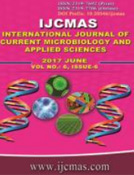


 National Academy of Agricultural Sciences (NAAS)
National Academy of Agricultural Sciences (NAAS)

|
PRINT ISSN : 2319-7692
Online ISSN : 2319-7706 Issues : 12 per year Publisher : Excellent Publishers Email : editorijcmas@gmail.com / submit@ijcmas.com Editor-in-chief: Dr.M.Prakash Index Copernicus ICV 2018: 95.39 NAAS RATING 2020: 5.38 |
1-Aminocyclopropane-1-carboxylic acid (ACC) oxidase (ACO), is one of the core enzymesin the ethylene biosynthesis pathway, which catalyzes the final step in ethylene biosynthesis converting ACC to ethylene, cyanide, CO2, dehydroascorbate and water with inputs of Fe(II), ascorbic, bicarbonate and oxygen.In the present study, a 1288 bp cDNA sequence fragment of the ACO gene (designated as GbACO) was isolated from ginkgo (Ginkgo biloba) leaves by using reverse transcriptase-polymerase chain reaction (RT-PCR) with two PCR primers designed according to the ginkgo transcriptome data. This cDNA sequence contained a 990bp open reading frame (ORF), which encoding a 329-amino-acid protein. The molecular weight and isoelectric point are 37.2 kDa and 5.20, respectively. The encoding amino-acid sequence showed high similarity to other plant ACO proteins. The secondary structure prediction indicated that GbACO protein comprised ofα-helix (40.43%), β-turn (10.33%), extended strand (13.07%), and random coil (36.17%). Phylogenetic tree analysis revealed that GbACO clustered with the ACO in the Gymnospermae clade.The isolation and characterization analysis of GbACO is helpful to understand the biosynthesis of ethylene in G. biloba at the molecular level and also provides some theoretical support for improving the ethylene production.
 |
 |
 |
 |
 |